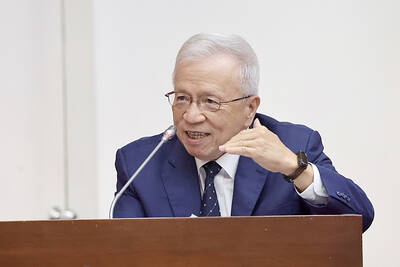The number of Taiwanese working in the United States rose to a record high of 137,000 in 2024, driven largely by Taiwan Semiconductor Manufacturing Co.’s (TSMC) rapid overseas expansion, according to government data released Wednesday.
A total of 666,000 Taiwanese nationals were employed abroad last year, an increase of 45,000 from 2023 and the highest level since the COVID-19 pandemic, data from the Directorate General of Budget, Accounting and Statistics (DGBAS) showed.
Overseas employment had steadily increased between 2009 and 2019, peaking at 739,000, before plunging to 319,000 in 2021 amid U.S.-China trade tensions, global supply chain shifts, reshoring by Taiwanese companies, and pandemic travel restrictions, the DGBAS said.

Photo: Bloomberg
The figure has rebounded over the past three years as Taiwan lifted border controls and countries including the U.S. have convinced TSMC to manufacture chips in their territory, it added.
DGBAS Deputy Census Director Tan Wen-ling (譚文玲) said that the latest rise is closely tied to TSMC’s new fabs in the U.S. state of Arizona and Japan’s Kumamoto Prefecture, both of which began mass production at the end of 2024.
They drew not only TSMC staff but also workers from related suppliers to work overseas, Tan said.
The DGBAS data also indicated that China (including Hong Kong and Macau) remained the top destination for Taiwanese workers in 2024 with 231,000 people, or 34.7 percent of the total overseas Taiwanese workers.
Before the pandemic, however, more than 400,000 Taiwanese were employed there -- over 60 percent of the total -- but numbers fell amid U.S.-China tensions, tech disputes, and rising labor and compliance costs in China.
The U.S.’ share of Taiwanese workers, meanwhile, rose to 20.5 percent, while Southeast Asia accounted for 14.6 percent. Japan and South Korea together made up 12 percent, with the number of Taiwanese working in those two countries reaching a record 80,000, the data showed.
Tan said more Taiwanese are heading to Japan and South Korea -- particularly Japan, which is actively seeking foreign talent to counter its rapidly aging population and growing openness to overseas labor and investment.

JITTERS: Nexperia has a 20 percent market share for chips powering simpler features such as window controls, and changing supply chains could take years European carmakers are looking into ways to scratch components made with parts from China, spooked by deepening geopolitical spats playing out through chipmaker Nexperia BV and Beijing’s export controls on rare earths. To protect operations from trade ructions, several automakers are pushing major suppliers to find permanent alternatives to Chinese semiconductors, people familiar with the matter said. The industry is considering broader changes to its supply chain to adapt to shifting geopolitics, Europe’s main suppliers lobby CLEPA head Matthias Zink said. “We had some indications already — questions like: ‘How can you supply me without this dependency on China?’” Zink, who also

At least US$50 million for the freedom of an Emirati sheikh: That is the king’s ransom paid two weeks ago to militants linked to al-Qaeda who are pushing to topple the Malian government and impose Islamic law. Alongside a crippling fuel blockade, the Group for the Support of Islam and Muslims (JNIM) has made kidnapping wealthy foreigners for a ransom a pillar of its strategy of “economic jihad.” Its goal: Oust the junta, which has struggled to contain Mali’s decade-long insurgency since taking power following back-to-back coups in 2020 and 2021, by scaring away investors and paralyzing the west African country’s economy.

BUST FEARS: While a KMT legislator asked if an AI bubble could affect Taiwan, the DGBAS minister said the sector appears on track to continue growing The local property market has cooled down moderately following a series of credit control measures designed to contain speculation, the central bank said yesterday, while remaining tight-lipped about potential rule relaxations. Lawmakers in a meeting of the legislature’s Finance Committee voiced concerns to central bank officials that the credit control measures have adversely affected the government’s tax income and small and medium-sized property developers, with limited positive effects. Housing prices have been climbing since 2016, even when the central bank imposed its first set of control measures in 2020, Chinese Nationalist Party (KMT) Legislator Lo Ting-wei (羅廷瑋) said. “Since the second half of

Taiwan Semiconductor Manufacturing Co (TSMC, 台積電) received about NT$147 billion (US$4.71 billion) in subsidies from the US, Japanese, German and Chinese governments over the past two years for its global expansion. Financial data compiled by the world’s largest contract chipmaker showed the company secured NT$4.77 billion in subsidies from the governments in the third quarter, bringing the total for the first three quarters of the year to about NT$71.9 billion. Along with the NT$75.16 billion in financial aid TSMC received last year, the chipmaker obtained NT$147 billion in subsidies in almost two years, the data showed. The subsidies received by its subsidiaries —